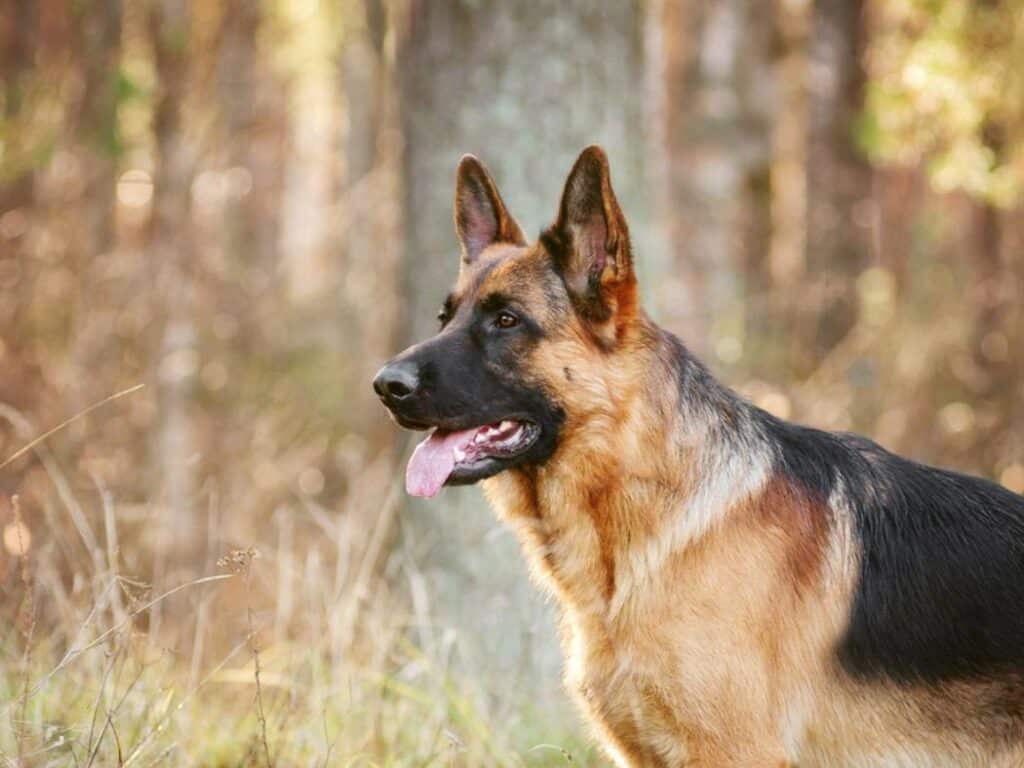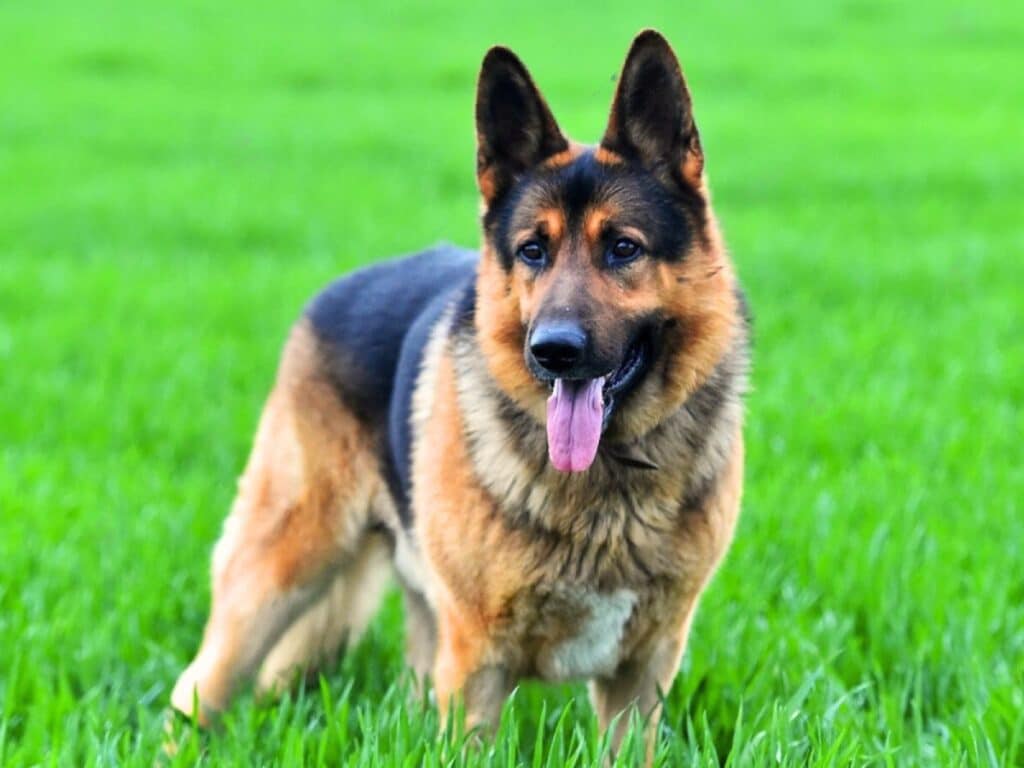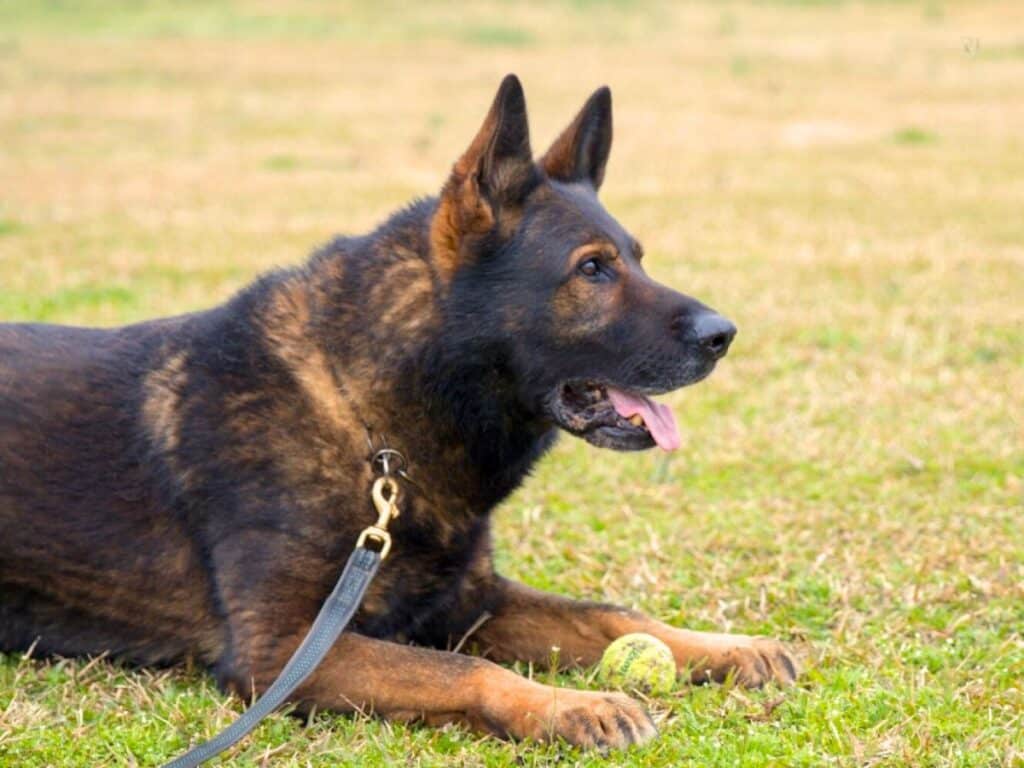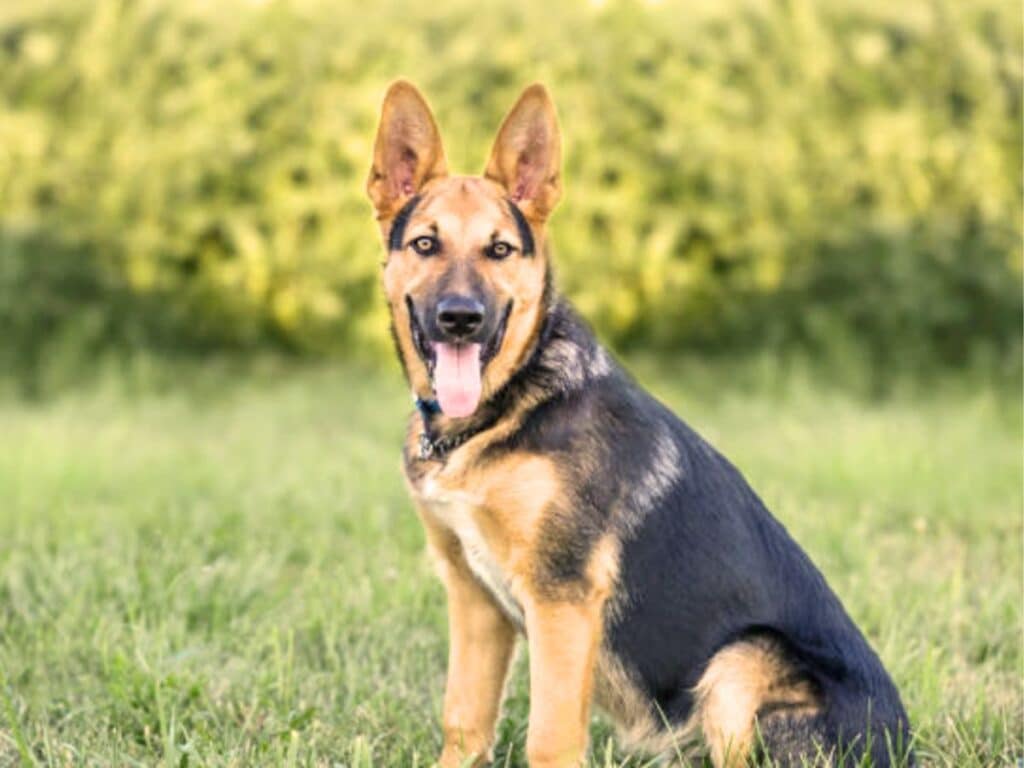Ah, the glorious chaos that comes with having an 8-month-old German Shepherd!
They’re like tornadoes wrapped in fur, capable of turning your house upside down in a matter of seconds.
But fear not, my fellow shepherd lover, because today we’re diving into the delightful world of these mischievous yet lovable pups.
From their boundless energy to their insatiable curiosity, we’ll uncover the secrets of raising an almost adult German Shepherd with style and a wagging tail.
Overall Appearance of an 8 Month Old German Shepherd

Weight
At 8 months old, German Shepherds can weigh anywhere from 50 to 70 pounds.
However, it’s important to note that the weight of a German Shepherd at this age is heavily influenced by their gender and genetics.
Males typically weigh between 62 to 66 lbs., while females can weigh from 53 to 57 lbs.
Height
By the time a German Shepherd reaches 8 months old, it will have reached about 75% of its adult height.
For males, this can range from 22 to 26 inches, while a female German shepherd typically grows to be between 20 to 24 inches tall.
During this time, their growth rate will start to slow down, but they will continue to gain muscle mass and develop their adult coat.
Coat
At 8 months old, your German Shepherd’s coat will continue to grow and thicken.
You may notice shedding, especially during the spring and fall seasons when your dog’s coat changes with the temperature.
Teething
Many German Shepherds at this age will be teething, which can cause them discomfort as well as lead them to chew on objects around the house.
Providing appropriate chewing toys can help alleviate this issue and prevent your dog from damaging your belongings.
Ears
While most German Shepherds may have fully erect ears by 8 months old, others may still have floppy ears that will eventually stand up as they grow older.
This is a normal part of their development, and owners should not be concerned if their dog’s ears haven’t fully stood up yet.
Behavior of an 8 Month Old German Shepherd
High Energy Level

8 months old German Shepherds are known for their high energy levels. They require regular exercise to prevent destructive behavior, such as chewing on furniture or digging holes in the yard.
It’s important to provide them with plenty of physical activity, such as daily walks and playtime in a fenced-in area.
In addition to physical activity, mental stimulation is also crucial at this age. Interactive toys and training exercises can help keep your German Shepherd mentally engaged and prevent boredom.
Boredom can lead to destructive behavior, so it’s important to provide plenty of activities that will keep your dog entertained.
Separation Anxiety
At this age, when your dog isn’t an adult yet, your pup may start displaying signs of separation anxiety.
This means they become anxious or distressed when left alone for extended periods.
Separation anxiety can lead to destructive behavior, such as chewing on furniture or barking excessively.
To prevent separation anxiety, it’s important to gradually get your German Shepherd used to being alone for short periods of time.
Start by leaving them alone for just a few minutes at a time and gradually increase the amount of time they spend alone.
Providing them with a comfortable space, such as a crate or designated area in the house, can also help ease their anxiety.
If your dog is seriously struggling with separation anxiety, make sure you check out this article that guides GSD owners on how to help their dogs deal with being alone in the house.
Stubbornness
German Shepherds are known for their intelligence but can be stubborn at times.
At 8 months old, they may exhibit a stubborn temperament when it comes to obedience training.
Consistent training and positive reinforcement can help establish good behavior and prevent stubbornness.
It’s important to establish yourself as the pack leader early on in your German Shepherd’s life.
This will help them understand their place in the family hierarchy and make training easier.
Territorial Behavior
German Shepherds are known for their protective nature, and at 8 months old, they may start displaying territorial behavior.
This means they may become aggressive towards other animals or people who enter their perceived territory.
To prevent aggressive behavior, it’s important to socialize your German Shepherd from a young age.
Training exercises that involve positive reinforcement can also help establish good behavior around strangers or unfamiliar animals.
Related article:
- 9 Month Old German Shepherd: Everything You Need To Know
- 10 Month Old German Shepherd: Complete Care Guide
Intelligent and Independent
German Shepherds are known for their intelligence, and at eight months old, they are already showing signs of being highly trainable.
However, they can also be independent thinkers and may exhibit stubbornness when it comes to following commands.
Consistent training is necessary to establish boundaries and reinforce positive behavior.
Loyal and Protective
One of the most endearing qualities of German Shepherds is their loyalty towards their owners.
At eight months old, they are starting to develop a strong bond with their family members and will often follow them around the house.
They also have a natural protective instinct that makes them excellent watchdogs. However, this can sometimes lead to territorial behavior if not properly socialized.
Sexual maturity in 8 month old German Shepherd

Mounting Behavior in a Male German Shepherd
At around 8 months old, a male German Shepherd may begin to exhibit mounting behavior. This is a natural part of their sexual development and is caused by an increase in testosterone levels.
Mounting behavior can be directed towards other dogs, objects, or even people.
It is important to understand that this behavior is not necessarily a sign of aggression but rather a normal aspect of canine sexuality.
First Heat Cycle in a Female German Shepherd
A Female German Shepherd typically experiences their first heat cycle between the ages of 6 and 12 months, with the average age being around 8 months old.
During this time, you may notice behavioral changes such as restlessness, increased vocalization, and heightened interest from male dogs.
It is essential to keep female dogs away from male dogs during their heat cycle as they are highly receptive to mating at this time.
If you do not plan on breeding your pup, spaying her before her first heat cycle can help prevent unwanted pregnancies and reduce the risk of certain health issues such as mammary tumors and uterine infections.
RELATED: German Shepherd Heat Cycle Explained
Check out this training video of an 8-month-old German Shepherd…
Feeding your 8-Month-Old German Shepherd:
Divide Meals Into Smaller Portions
One important thing to keep in mind when feeding your 8-month-old puppy is portion control.
Instead of giving them one or two large meals per day, divide their meals into three to four smaller portions throughout the day.
This method aids in digestion and prevents overeating, which can lead to obesity and other health issues.
Choose The Right Dog Food
Choosing the right puppy food for your 8-month-old German Shepherd is important for their growth and development.
Look for high-quality puppy food that is specifically formulated for large breeds, as German Shepherds are prone to joint issues.
The food should have a balance of protein, fat, and carbohydrates, with protein making up at least 22% of the diet.
Avoid foods with artificial preservatives, colors, and flavors, as well as those that contain fillers like corn, wheat, and soy.
These ingredients can be difficult for puppies to digest and may contribute to food allergies or digestive issues.
Dry & Wet Dog Food
Both dry and wet food can be suitable options for feeding your pup, and each has its advantages and disadvantages.
Dry kibble is a convenient option as it is easy to store, does not require refrigeration, and can be left out in a bowl for longer periods without spoiling.
Kibble can also help promote healthy teeth and gums by reducing tartar buildup.
However, it may be more difficult for some puppies to digest, and they may need to drink more water to avoid dehydration.
Wet food, on the other hand, can be more palatable and easier for some puppies to digest.
It also contains a higher moisture content, which can be beneficial for puppies who do not drink enough water.
However, wet food can spoil quickly and needs to be refrigerated or discarded after a certain amount of time.
How Much Food Does an 8 Month Old Pup Need?
How much food your pup needs will depend on their weight, activity level, and overall health.
You can consult with your veterinarian to determine the appropriate amount and type of food for your doggy’s specific needs.
Avoid Feeding Your Doggy Table Scraps
In addition to regular meals, it is important to provide your puppy with plenty of fresh, clean water throughout the day.
Avoid giving your doggy table scraps or human food, as this can disrupt their digestive system and lead to health problems.
RELATED: Do German Shepherds Drink a Lot of Water?
Exercise Needs of Your Dog

Physical Exercises
German Shepherds are known for their high energy levels and require plenty of exercise to keep them healthy and happy.
At 8 months old, they should have at least 2 hours of exercise daily.
Physical exercise is essential for keeping their muscles strong, maintaining a healthy weight, and preventing destructive behavior.
Running is an excellent form of physical exercise for dogs. It allows them to burn off excess energy while building endurance.
However, it’s important to start slowly and gradually increase the intensity of the run over time. This will help prevent injury or exhaustion.
Hiking is another great way to provide your doggy with physical exercise.
It not only provides cardiovascular benefits but also exposes them to new sights and smells that can stimulate their senses.
When hiking with your doggy, make sure to bring plenty of water and take breaks as needed.
Playing fetch is a fun way to incorporate physical exercise into your doggy’s routine.
Not only does it provide cardiovascular benefits, but it also helps improve their coordination skills. Make sure to use a ball or toy that is appropriate for their size and breed.
RELATED: How Much Exercise Does a German Shepherd Need A Day?
Mental Stimulation
In addition to physical exercise, mental stimulation is equally important for German Shepherds at 8 months old.
Without proper mental stimulation, they can become bored and engage in destructive behavior such as chewing on furniture or digging holes in the yard.
Puzzle toys are another great way to provide mental stimulation for your doggy. These toys challenge dogs mentally by requiring them to figure out how to get a treat or toy out of the puzzle.
They come in various levels of difficulty, so make sure to start with an easier one and gradually increase the difficulty over time.
Scent work is another great way to provide mental stimulation for your dog.
German Shepherds have an excellent sense of smell and enjoy using it to track scents.
You can hide treats around the house or yard and encourage your doggy to find them using their nose.
Gradually Increase Exercise Intensity
It’s important to gradually increase exercise intensity for your 8-month-old German Shepherd to avoid injury or exhaustion.
Start with shorter walks or runs and gradually increase the distance over time.
When hiking, start with easy trails and gradually move on to more challenging ones as your doggy’s endurance improves.
When providing mental stimulation through obedience training, start with basic commands such as sit and stay before moving on to more advanced ones like roll over or play dead.
With puzzle toys, start with an easier one that they can solve quickly before moving on to more difficult ones.
Training for 8 Month Old German Shepherd

Obedience Training
Obedience training is an excellent way to provide mental stimulation while also teaching your dog valuable commands.
It helps to establish a strong and positive relationship between you and your dog, while also ensuring their safety and well-being.
Basic obedience commands such as “sit,” “stay,” “down,” and “come” should be taught to your doggy. These commands are important for keeping your dog safe in public spaces, as well as at home.
Recall Training
Recall training for your pup is important for safety reasons. It teaches your dog to come back to you when called, even in distracting environments.
Start by practicing recall in a quiet area with few distractions. Call your dog’s name followed by basic commands such as “come” or “here.”
When they come back to you, reward them with treats and praise.
Gradually increase the level of distraction during recall training sessions until your dog can reliably come back to you even in busy environments.
Positive Reinforcement Techniques
Positive reinforcement techniques are effective in encouraging desired behaviors during training sessions. Use treats and praise to reinforce good behavior immediately after it occurs.
For example, if your dog sits on command, give them a treat right away while saying “good sit!” This positive feedback will encourage them to repeat the behavior next time they hear the command.
Health and Care for Your 8 Month Old German Shepherd
Regular Vet Check-Ups
Keeping your 8 month old German Shepherd healthy should be a top priority. Regular vet check-ups are essential to ensure that your dog is healthy and up-to-date on vaccinations.
Dogs can’t tell us when they’re feeling unwell, so it’s important to take them for regular check-ups with the vet.
During these check-ups, the vet will examine your dog from head to tail, checking for any signs of illness or injury.
They may also recommend certain tests or procedures to keep your dog healthy. For example, they may recommend a dental cleaning or blood work to check for any underlying health issues.
Proper Nutrition
Feeding your 8 month old pup a balanced diet is crucial for their growth and development. High-quality protein and essential nutrients are key components of a healthy diet for dogs.
You can feed your dog commercial dog food or prepare homemade meals using high-quality ingredients.
It’s important not to overfeed your dog as this can lead to obesity and other health problems.
Regular Exercise
Exercise is necessary to keep your puppy physically and mentally healthy. Aim for at least 30 minutes of exercise per day, such as walking, running, playing fetch, or swimming.
RELATED: Can German Shepherds Swim?
Grooming
Grooming is an important part of caring for your 8 month old German Shepherd. Regular grooming helps prevent skin infections, matting, and other health issues.
Brush their coat regularly to remove loose hair and dirt while promoting healthy skin and coat.
Trim their nails as needed to prevent them from becoming too long and causing discomfort or injury.
Cleaning your dog’s ears is also important to prevent infections.
Use a gentle ear cleaning solution and cotton balls to clean the outer ear canal, being careful not to insert anything into the ear canal itself.
Home Safety
Keeping your home safe for your 8 month old German Shepherd is important for their health and well-being.
Keep hazardous items out of reach, such as cleaning supplies, medications, and toxic foods like chocolate or grapes.
Provide a comfortable living space for your German Shepherd puppy with a cozy bed and plenty of toys to keep them entertained.
Supervise your dog when necessary, especially if they are still learning what is appropriate behavior in the home.
Common Health Issues

It is essential to keep your doggy healthy and happy. However, like all breeds, they are susceptible to certain health issues that you should be aware of.
Here are some common health problems that may trouble your german shepherd puppy:
Hip Dysplasia
One of the most common health issues in German Shepherds is hip dysplasia.
This condition occurs when the hip joint doesn’t develop correctly, leading to arthritis and lameness.
Although it’s a genetic problem, other factors like weight gain can exacerbate the issue.
Bloat
Another common problem is bloat or gastric torsion. It happens when the stomach fills with gas and twists on itself, causing severe pain and even death if not treated promptly.
Skin Allergies
Dermatitis is also prevalent in German Shepherds due to their thick coat. They are prone to skin allergies, which can lead to itching, scratching, and hair loss.
Degenerative Myelopathy
Degenerative Myelopathy is a neurological condition that affects the spinal cord, causing weakness and loss of coordination in the hind legs. (Source)
It is more common in older German Shepherds, but can occur in younger dogs as well.
Panosteitis
Also known as “growing pains,” this condition causes pain and lameness in young dogs. It usually resolves on its own as the dog grows, but can be managed with pain medication.
Ear Infections
German Shepherds have floppy ears, which can trap moisture and create a breeding ground for bacteria. This can lead to ear infections if not properly cleaned and maintained.
To avoid these troubles from happening to your German Shepherd puppy, it’s crucial to take preventive measures such as regular exercise and a balanced diet.
Schedule routine check-ups with your veterinarian for early detection of any underlying conditions.
Sleep Requirements
Just like human babies, your puppy also requires a lot of sleep to support their growth and development.
It is important to make sure your doggy gets enough sleep to stay healthy and happy.
On average, an 8 month old German Shepherd puppy needs around 14-16 hours of sleep per day.
This sleep can be broken up into several naps throughout the day and night, as well as a longer period of uninterrupted sleep at night.
It is important to establish a consistent sleep routine for your geran shepherd puppy to help them get the rest they need.
Provide a comfortable and quiet sleeping area for your puppy to rest, and make sure they have access to fresh water and a bathroom break before bedtime.
RELATED: How Many Hours Does a German Shepherd Sleep?
Conclusion
An 8 month old German Shepherd requires a lot of care and attention. From feeding and grooming to training and exercise, there are many aspects of raising a healthy and happy German Shepherd.
Remember to provide your puppy with a nutritious diet, plenty of exercise, and regular veterinary check-ups. Be patient and consistent with training, and consider enrolling your puppy in obedience or scent work classes to help them develop their skills.
Additionally, be aware of common health issues that can affect German Shepherds, and monitor your puppy for any signs of illness or discomfort. With proper care and attention, you can help ensure your German shepherd puppy grows into a healthy and well-behaved adult dog.
Frequently Asked Questions (FAQs)
What does an 8 month old German Shepherd look like?
At 8 months old, a German Shepherd will likely be around 22-26 inches tall at the shoulder and weigh between 50-70 pounds. They will have a sleek and muscular build, with a thick, double coat. Their ears may be fully erect or still be in the process of standing up straight, and they will have a lively and alert expression.
How much should a 8 month old German Shepherd eat?
At this age, your pet typically needs around 2-3 cups of high-quality dog food per day, split into two meals. However, the exact amount can vary based on factors such as activity level, metabolism, and overall health. It is important to consult with your veterinarian to determine how much food is appropriate for your puppy.
Why is my 8 month old German Shepherd not eating?
There are several reasons why an 8 month old German Shepherd may not be eating, including illness, dental issues, stress, or a change in routine or diet. If your puppy is not eating or has a decreased appetite for more than a day or two, it is important to consult with your veterinarian to rule out any underlying health issues and determine the best course of action.
What to expect from an 8 month old German Shepherd?
At this age, a German Shepherd is still a puppy but is approaching adolescence. They may be more independent and confident than when they were younger, but still require plenty of guidance and proper training.
They will have a lot of energy and require regular exercise and playtime to stay healthy and happy. They may also be teething, so it is important to provide them with appropriate chewing toys and treats to satisfy their urge to chew.




